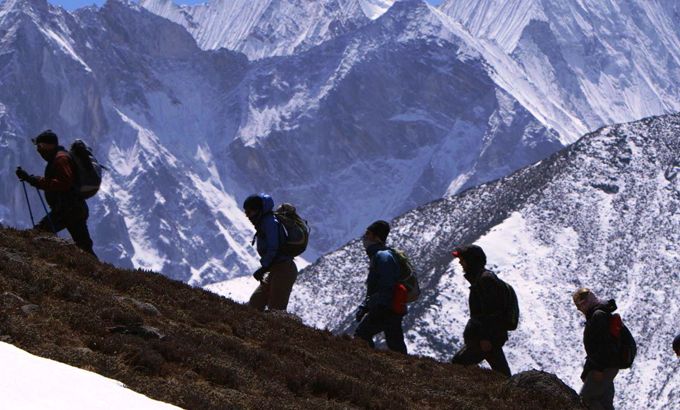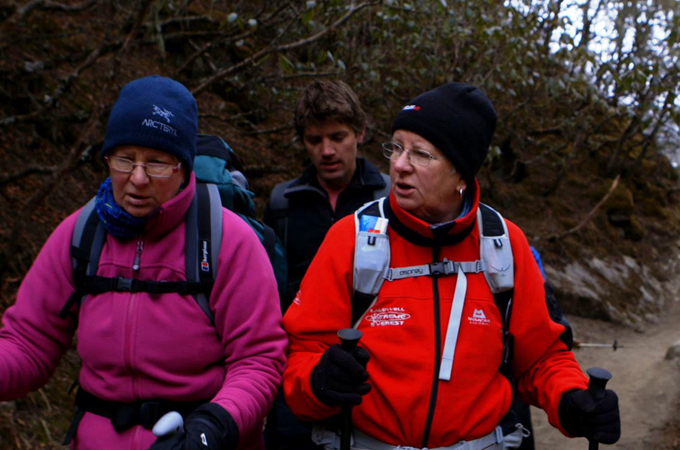
Special: Doctors on Everest
Doctors travel to Everest to carry out research into why some patients die from oxygen deprivation while others survive.
A lack of oxygen in the body is a major cause of death in intensive care. Yet little is known about why some people die from the condition, known as hypoxia, while others survive.
In this special edition of The Cure, anaesthetist Dr Joff Lacey joins medics and some of the 200 or so volunteers on Everest in the largest high altitude study of its kind.
Using oxygen-thin air at altitude to simulate the effects of hypoxia suffered by intensive care patients, doctors examine volunteers, including identical twins Jenn Price and Jan Taylor, pictured to try to work out how the body adapts to oxygen deprivation.
The researchers also examine a large group of Sherpas, analysing them at a cellular level to discover how they are so well adapted to oxygen-thin air.
In all, medics carry out around 65 separate studies, collecting hundreds of samples, from muscle biopsies to nitric oxide readings.
Their findings could ultimately change the way critically ill patients are treated, potentially saving the lives of hundreds of thousands of people with a range of diseases, including cancer, diabetes and heart and lung disease.
| A journey to the Himalayas |
By Dr Joff Lacey, The Cure reporter and Xtreme Everest researcher
My journey to the Himalayas involves numerous and varied forms of transport that every great adventure should include.
Most notable is a short but treacherous flight from Kathmandu to Lukla in an old Dash propeller aircraft, battling changeable weather conditions and precarious mountain ridges to land on a short steep strip etched into the edge of a mountain.
 |
| Everest twins and Dr Joff Lacey [Al Jazeera] |
“It’s not the most dangerous flight in the world”, says one of the team, “but I guess it’s in the top three!”
With feet on terra firma we set off on the long trek to Everest base camp.
It is a spectacular trek both in terms of scenery and cultural experience: rounding every corner provides a different spectacle as you pass through the range of landscapes from lush alpine forest to barren glacial moraine; many Sherpa villages are dotted along the route, providing a valuable opportunity to enjoy the wonderful warmth and hospitality of this extraordinary people.
The Xtreme Everest team have set up three laboratories for the project, in Kathmandu (1,400m), Namche Bazaar (3,500m) and at Everest Base Camp itself (5,300m). The labs are packed with cutting edge scientific equipment, allowing the collection of like-minded doctors, nurses and scientists to carry out their 60-plus projects to the highest standard. An incredible logistical feat when you realise that every piece of kit, every test tube, every pen has been brought over in barrels from the UK.
The atmosphere amongst the team is one of great excitement, you can sense everyone’s awareness that a world first is taking place and there is a clear determination that the science they produce be world class.
Every aspect of the volunteers’ physiology is being investigated: urine and blood samples, breath analysis, blood flow measurement and muscle biopsies.
It is important to mention that the unique feature of this project is that a large proportion of the volunteers are in fact Sherpa, the team are well aware that unpicking the secrets as to why the Sherpa are so well adapted to the hypoxic environment of high altitude is key to the research. This is the first time that a study on this scale and in this depth has been done on the Sherpa physiology.
The findings could then be applied to develop alternative treatments for intensive care and may revolutionise the way doctors manage the sickest of patients.
Seeing first-hand the work being undertaken by the Xtreme Everest team, I have confidence that their findings will have a significant impact on the medical world, but it is the extent of this influence that is as yet unclear, and it is that which fills me with great excitement.
Watch The Cure on Tuesday 2230; Wednesday 0930; Thursday 0330; Friday 1630; Saturday 2230; Sunday 0930; Monday 0330; Tuesday 1630 GMT. |
